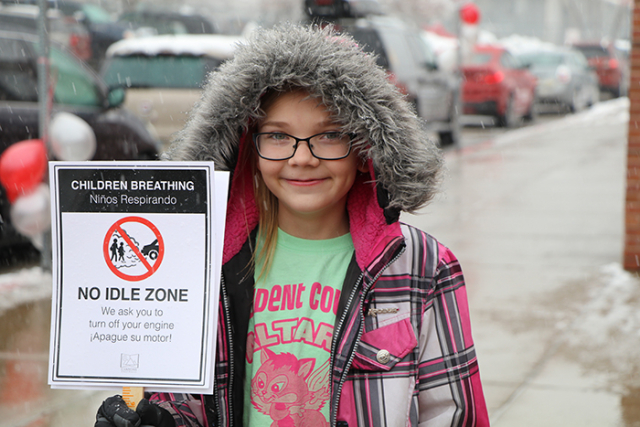
When it comes to big problems, such as air pollution and Utah’s inversion season, it can be easy to feel overwhelmed and defeated. But we’re all a part of the solution, and if we pull together — each of us doing our small part — collectively, we can make a big difference.
Such was the theme of an early-morning press event at Willow Springs Elementary where Canyons District joined Draper City, the Salt Lake County Health Department, clean air groups, elected leaders, parent advocates and researchers to issue a clean air challenge. On Earth Day, 2016, Canyons declared all of its campuses idle-free zones. Now, in partnership with Draper City, which recently adopted a no idling resolution, Canyons is re-doubling efforts to empower students, employees, parents and patrons to make healthy choices by combining car trips to conserve gas, walking and biking to school, and reducing schoolyard idling during morning drop-offs and afternoon pick-ups.
“Besides educating children, we feel we have a moral responsibility to safeguard their health,” says Canyons District Superintendent Dr. James Briscoe. “’It’s up to all of us to do our part, and it will take all of us, considering the growth projected for Utah in the coming years.”
The press event marked the start of Idle Free Week, Jan. 13-16, and the launch of a mobile, scientific-grade air monitor, which will measure trace gases and pollutants — particulate matter, carbon dioxide, and NOx, or nitrous oxides — outside Willow Springs to determine how much of a difference one school community can make by volunteering to turn off their ignition while waiting in line to drop children at school or pick them up in the afternoon.
The air monitoring will serve as an important a gauge of whether educational efforts change idling behaviors and reduce harmful emissions, says Draper City Mayor Troy Walker.The equipment, provided courtesy of the Salt Lake County Health Department, is a common site at public places throughout the inversion-prone Salt Lake Valley, including schools. Researchers at the University of Utah and Weber State University use it as a data-gathering tool to better understand what contributes to poor air quality and how to prevent it.
Affectionately known as the “Nerd Mobile,” the monitor earned a new moniker with Willow Springs students dubbing it, “Claire the Air Monitor” for its temporary stay. A vinyl cling adhered to the van made it official.Draper City also provided CSD’s schools with a Clean Air Tool-Kit filled with fun, interactive activities corresponding with the designated theme days.
- Monday: Monitor the Air
- Tuesday: Reduce Cold Starts
- Wednesday: Be Idle Free
- Thursday: Stop the Hot Spots
- Friday: no school
Children are especially susceptible to air pollution, making schools a logical site for monitoring the benefits of a no-idling campaign. “Young lungs are still developing, they breathe more rapidly, and they can inhale more particulates in a short time,” says Dr. Royal DeLegge, Environmental Health Director for Salt Lake County Health Department.
In Utah, 53 percent of harmful particulates in the air are generated by mobile sources. There is evidence of concentrations of air pollution called “hot spots” along traffic corridors, at local shopping centers, the drive-through lanes at fast food restaurants and outside schools due to large numbers of vehicles running their engines in confined spaces.Vehicles aren’t the only source of the problem. But volunteering to turn our keys and be idle-free could be a practical, largely pain-free part of the solution.”In our efforts to clear the air there are no perfect answers,” says Thom Carter, Executive Director of the Utah Clean Air Partnership (UCAIR). “But there are practical solutions.”
IDLE FREE TIPS (even when it’s cold outside)
- Keep blankets in the car, especially if you have little ones in car seats.
- Wear coats and other weather-appropriate gear (hats, gloves, scarves) when it’s cold. Layer up!
- During the summer, open windows and park in the shade.
- Most cars warm up within a few minutes of driving, so get in and go! Car engines today can operate just fine in cold weather – no need to “warm up your engine” prior to leaving.
- Sitting in a cold car isn’t uncomfortable if you are prepared. Making sure you and your children are dressed for the weather is an important step in helping keep our air clean

